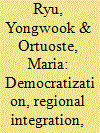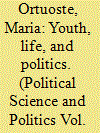|
|
|
Sort Order |
|
|
|
Items / Page
|
|
|
|
|
|
|
| Srl | Item |
| 1 |
ID:
131352


|
|
|
|
|
| Publication |
2014.
|
| Summary/Abstract |
The establishment of the Association of Southeast Asian Nations' (ASEAN) Intergovernmental Commission on Human Rights (AICHR) is extremely puzzling, because many ASEAN members have never been strong supporters of human rights, nor have they been advocates for intervening in the name of human rights. Why did ASEAN members, then, agree to establish the AICHR? We argue that the AICHR is the result of two factors: democratization in key regional countries and the intensifying effort of regional integration in the form of the ASEAN Community project. The former factor engendered key agents for pro-human rights initiatives and set the direction of human rights development within ASEAN. The latter factor weakened the old norms of the ASEAN Way and engendered new regional norms such as good governance and accountability, which were conducive to the development of human rights. It also provided persuasive power based on a shared sense of collective purpose in eliciting agreement from the authoritarian members for the AICHR. We support our argument with the analysis of all ASEAN vision statements and its ministerial meeting statements from 1967 to 2010 as well as our own interviews. The analysis shows that the emergence of new regional norms was closely associated with the development of the ASEAN Community project, and this normative change resulted in a different view of human rights, whose promotion would positively affect regional integration and stability. Our argument suggests a different perspective of a regional human rights mechanism essentially as a regional body reflecting regional norms and values.
|
|
|
|
|
|
|
|
|
|
|
|
|
|
|
|
| 2 |
ID:
111966


|
|
|
|
|
| Publication |
2012.
|
| Summary/Abstract |
The traditional way of introducing comparative politics to freshmen, which is through the study of institutions, is contrasted with an alternative approach. An everyday-politics approach compares the daily struggles of global youth-how they cope in times of peace and war, and with issues of wealth and poverty, identity, education and employment, and citizenship and immigration. This approach contains four elements: juxtapositions, recognition of the vicissitudes of growing up in a more complex world, the use of stories, and social action in our daily lives. This combination "gently" introduces the concepts of comparative politics but with an emphasis on how politics affect the lives of other young people. These stories also show the various forms of political participation and political resistance in different countries. An everyday-politics approach, while still experimental, seems to yield some positive results in helping students care about politics, gaining an understanding of how much is at stake for them, and connecting them to the wider world.
|
|
|
|
|
|
|
|
|
|
|
|
|
|
|
|
|
|
|
|
|